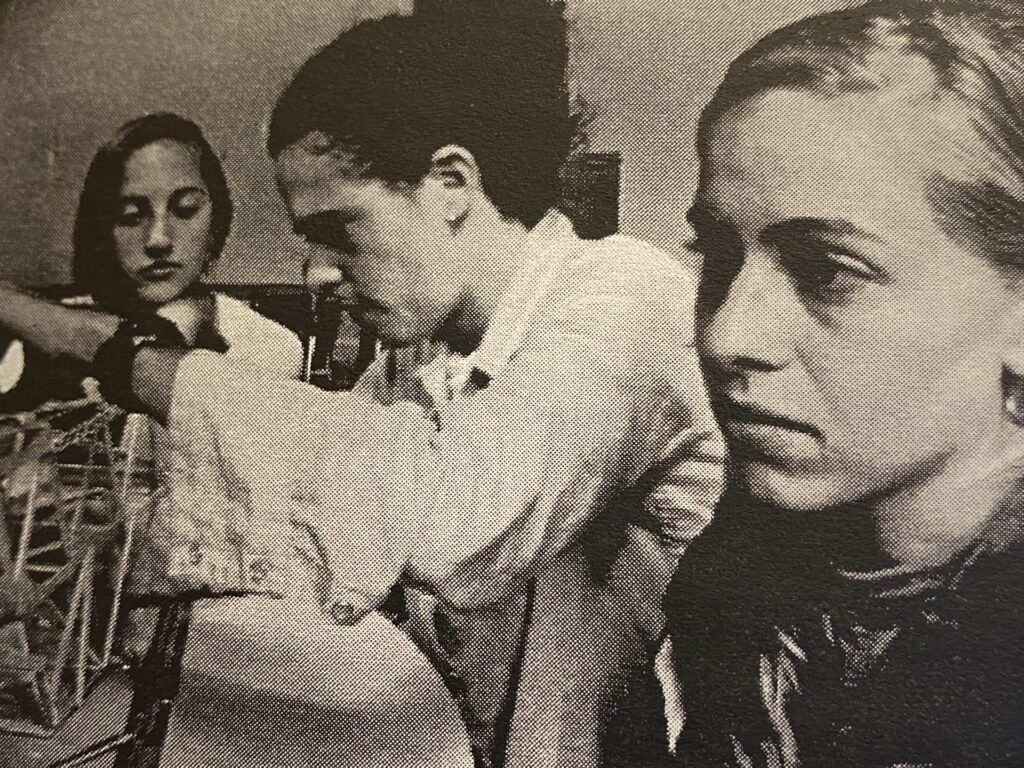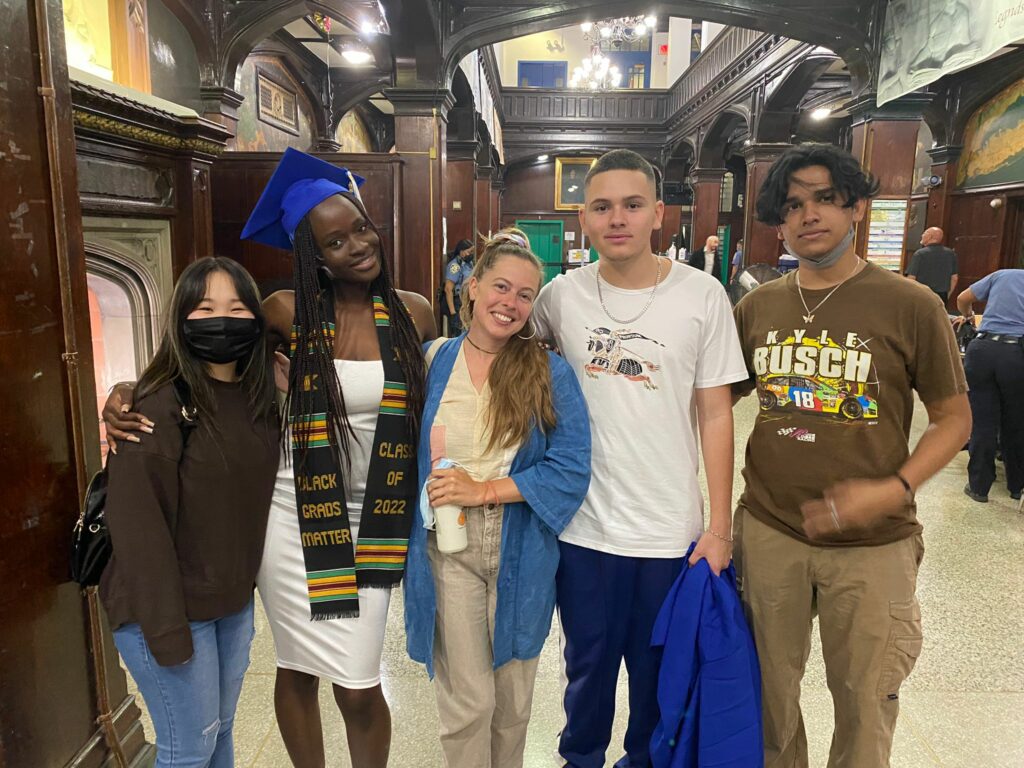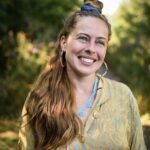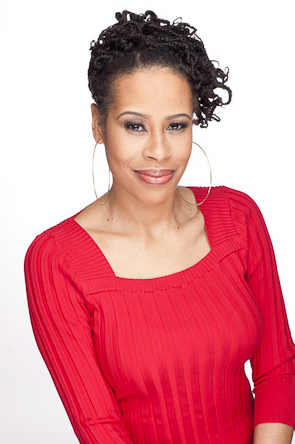I entered my pubescent years with dramatic angst. With a fervor to break out of my suburban cocoon, I was edgy and ready for risk. During school that year, I experimented with skipping my first class—gym—by hiding with a friend in a bathroom stall, standing on the toilets so no one could see our feet. My 8th grade band conductor once sent me to the principal’s office when I wouldn’t stop laughing at my distorted reflection in my baritone horn’s rounded metal tube. Shortly after, I quit the baritone horn entirely, not wanting to be identified with band altogether. I remember being part of a disruptive group in class that made our math teacher cry and scream at us that she wished she never left her high-paying, corporate job.
My parents had lost much sway over my direction. At this fragile point in my metamorphosis, I needed adults that I thought were cool enough to handle me, and I didn’t seem to be finding them in my teachers at school.
Luckily, I had a camp. Unexpectedly, a writing camp. The Writer’s Express (WeX) was founded in the 1990s by a husband and wife team, Debbie Reck and Arthur Unobsky, teachers who were also my neighbors at home. I fell in love with The Writer’s Express when I was a nerdy incoming sixth grader who requested a camp that had “sports and writing.” Housed on the Tufts University campus in Somerville, Massachusetts, the camp enrolled middle schoolers from Boston and the surrounding areas. Intentional advertising and scholarship opportunities made WeX one of the most diverse spaces across race and class I had been a part of as a middle-class white kid growing up in the suburbs.
We learned the power of making each other laugh with our words, and we learned how to say what we liked about someone’s work in a way that let them know we were really listening. I learned how good it felt to be heard.
The premise of WeX was simple: campers would be exposed to novel experiences and then journal about them immediately afterwards. They offered activities like kung-fu, canoeing, pizza-making, mud-painting, and the much-anticipated overnight to what we referred to as a “hippie commune” in Vermont, where we white-water rafted, learned about composting toilets, drank pine needle tea, gawked at hairy armpits—and wrote about all of it. The belief was that this kind of immediacy of experience would encourage in young people vivid, fresh, authentic writing. In a daily circle we shared our journal entries, and we got to know each other more intimately through our work. We learned the power of making each other laugh with our words, and we learned how to say what we liked about someone’s work in a way that let them know we were really listening. I learned how good it felt to be heard.
The informality of WeX was part of what kept me engaged as I entered adolescence: our counselors getting lost as they drove us from place to place in rented vans, the impromptu decisions to stop for ice cream on the way home from our camping excursions. Our senior counselors were aspiring writers, grad students or teachers in their 20s and 30s. We brought in our own CDs from home to play in the vans. Sisqo’s “Thong Song” was my number one request, and I don’t recall anyone telling me to turn it off.
During the summer of 2002, just after I graduated from eighth grade, I was placed in Abbye Meyer’s writing group at WeX. Abbye commented nightly on my journal entries and edited my short stories, which we drafted and revised during the second half of our two-week sessions. She had a dry, quirky sense of humor, a sly smile often on her face, and was quick to identify whatever weird or funny thing was happening in the room. She had spent time in Scotland and always played the bagpipes during WeX’s talent show, descending slowly down a hill, in a kilt, to meet the audience. Her fondness for me quickly became apparent in the nickname she gave me—“Libstyle”— or “Style” for short. In turn, to me, she was “Abstyle.”
I used the fiction writing opportunity at WeX as an outlet for my romantic aspirations. Under Abbye’s editing guidance, I wrote “True Love,” a story that allowed me to give voice to this new phase of my development and bolstered my confidence in my writing abilities. I had “dated” someone at camp that summer, but we struggled to find our spark. “So, what’s your favorite color?” I remember him asking after a long pause of sitting on a bench together. I yearned for actual intimacy.
Elements of “True Love” were loosely borrowed from the 2000 teen romance film Love and Basketball, chronicling two next door neighbors, close friends who eventually realize they’re in love. My main characters, Jackie and Nathan, were also next-door neighbors, and Jackie’s feelings also become romantic, unbeknownst to Nathan. When Jackie tells Nathan she loves him, and he interprets it as only a “friend” kind of love, the story ends with this despairing scene:
“Her eyes shut with an unbelievably tired, emotionally drained, and exasperated expression on her face. She urged to connect with him and look deeply into his eyes and say it again, and let him experience her feelings for himself. Some tears squeezed out of her closed eyes, revealing her true passion.”
I don’t remember much of what the editing process for this piece looked like, except that Abbye made me feel as if I had written a masterpiece. Rather than dismissing my work as an overly dramatic, aching teen love story, Abbye applauded me for writing an ending that allowed for some messiness, which, to my credit, diverged from the Love and Basketball narrative.
That summer ignited a longstanding friendship and mentorship in which Abbye championed my leadership and writing abilities. Even at that early stage, I remember her feedback on my work being thoughtful and concise. She helped me identify how some details enhance a mood, plot, or character, while others served little purpose in driving anything forward. Looking back at “True Love,” I wince at the corniness, but Abbye uplifted me for what was an age-appropriate milestone: writing a piece that ended with some degree of nuance—neither a neatly wrapped bow, nor a tragic blow. It was a story with emotional depth, mirroring and providing catharsis for my own desires.
Abbye played on my strengths and held me accountable to my responsibilities without ever feeling patronizing.
The next summer, as a rising high school sophomore, I began working under Abbye as a junior counselor. At the age of 15, the transition from camper to counselor wasn’t always seamless for me. Once, during an end of session beach trip, I ran directly into the water with a group of campers upon arrival, despite having no green light to do so from the senior counselors. I was included in a brief time out. Despite my pseudo-staff member status and constant socializing with my fellow junior counselors, Abbye played on my strengths and held me accountable to my responsibilities without ever feeling patronizing.
Once, during a lunch break, she called me over from the counselor friends I had been with all day. “Libstyle, can you go sit over at the table with Sebastian? It seems like he’s having a tough day. Bring him into a group with some other people.” Abbye’s approach made me feel like I was capable of important things, even when I struggled to take initiative on them myself.

The second half of high school brought a shift in my persona. I had exhausted myself with drinking, partying, and a fair share of heartbreak. In a true adolescent oscillation, my new interests included meditation, yoga, underground hip-hop, and classic films. Through this transition, my relationship with Abbye continued to support my growth and understanding of myself as a writer.
She drew me into administrative duties at camp, paying me to assist in the editing of camp’s annual writing collections. She urged me to continue writing short stories to submit to the collection, even though it was optional for counselors to contribute, and responded to my work with feedback that challenged me.
“WATCH THE VERB TENSE, Lib. Keep it in the present. That’s when it’s really real and moving. I wonder about when you enter Mark’s head—do you want to be in all the character’s heads? Or just Joy’s? Watch the comma splices—either stick a conjunction in there or use a period or semicolon. Send me more, Libstyle. Love, Ab.”
I was a teenager, and I had someone taking my creative work seriously. This wasn’t for a grade—it was operating outside that whole apparatus. Abbye didn’t respond to my work because it was her job. She responded to my work because she cared about me and thought I had potential.
Looking back on this relationship, I see how so much of my affinity for nurturing young people and giving them leadership opportunities comes directly from the mentorship I received as a teen. When I ran summer and after school programs at a community center in the Lower East Side, campers that began with us as budding middle schoolers often traveled with the program through the years to become paid junior and senior counselors. Two teens from a poetry class I taught now do a paid weekly internship with my partner, supporting his business as an artisan. In this space, our relationships have taken on new dimensions, including sharing meals and trading stories about our lives that wouldn’t have had space to come out within the classroom. This impulse to relate to teens in a more holistic way, as both a teacher and a human being, undoubtedly springs from the support Abbye offered me when I was the same age.
That winter in 2005, Abbye organized an out-of-camp writing group for WeX junior and senior staff, and several of us high school seniors were included. Through our busy schedules, sports teams, college applications and homework loads, Abbye nudged us along towards developing and submitting work. She encouraged us to send work even if it was a half-done draft. “We’ll all be insecure,” she wrote, “thus making none of us insecure.”
By normalizing the vulnerability that comes with sharing, Abbye encouraged us to not be overwhelmed by perfectionist impulses.
By normalizing the vulnerability that comes with sharing, Abbye encouraged us to not be overwhelmed by perfectionist impulses. We began monthly meet ups at coffee shops in Brookline, Cambridge, and Somerville to discuss our work over hot drinks—like real writers, it felt. I used the writing group that year to continue finding my voice, writing fiction and non-fiction that grappled with themes like difficult relationship dynamics, toxic masculinity, and finding meaning in fleeting conversations with strangers. Abbye continued to coach my craft, sharing when a paragraph felt skippable or excessive, when an ending felt too neat, or when a description really struck her.
I learned from Abbye that being a good teacher didn’t always mean laying on endless praise. I both knew she believed in my work, and for that very reason, would find what could be better. I came to trust and internalize her feedback.
Befriending and mentoring teens, especially in out of school time contexts, comes with a boundary-dance around how much to share of my personal life and stories—refraining from sharing anything that would make students feel overwhelmed or responsible to “fix” my feelings or experiences, but not holding back so much that they feel they never truly know me. That dance is not always perfectly navigated, but it is essential if we are to build relationships that are authentic. Abbye modeled this to me with grace and maturity.

The next year I went to college in California, and little by little, Abbye and I fell out of touch. Although my path from that point on was far from straightforward, I had been imbued with a sense that I belonged somewhere—in a world of stories and ideas, in a world where people pay attention to what each other think and feel, and how they express it. Although not every space I found myself in reflected that back to me so generously, I knew it had been true somewhere. I take great pride in creating spaces like that for others through my teaching artistry and community arts work.
Just a few weeks ago, I had the first day of a 10-week poetry residency at a new high school in Brooklyn. It was nearing the end of writing time when I spotted two students playing slide, a clapping game that I remembered playing incessantly at WeX. I jumped in to play a round, discovering at first that I was a bit rusty, but quickly finding my groove. As I felt the classroom teacher watching us, slapping the fronts and backs of our hands together faster and faster, I wondered for a moment if I was forming a bad impression, coming off as too relaxed. No matter, I told myself. Our faces broke into giant grins as we could no longer keep up the pace. Abbye would’ve approved.
Also by Libby Mislan: “Shout Out Poems: Explore the Musical and Rhythmic Elements of Spoken Poetry with Sekou Sundiata’s ‘Shout Out‘”
Featured photo by Mati Mango.
Libby Mislan (she/her) is a poet and community-based artist living in Brooklyn, New York. She received her MFA in poetry from Vermont College of Fine Arts in 2018 and has since worked on poetry projects supported by Queens Council on the Arts and New York State Council on the Arts that explore the restoration of health on personal, interpersonal, and societal levels. Libby is a firm believer in the power of the arts as a vehicle for collective transformation. In addition to her own creative process, she designs and facilitates arts projects and workshops to engage communities in creative expression. She works as a teaching artist in New York City public schools with non-profit organizations Community-Word Project, City Lore, and Teachers & Writers Collaborative. Libby is also a certified leader in InterPlay, an active, creative approach to unlock the wisdom of the body that uses improvisational storytelling, movement, and song.



